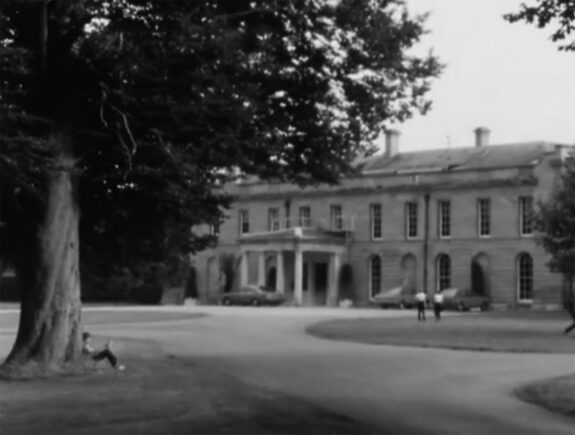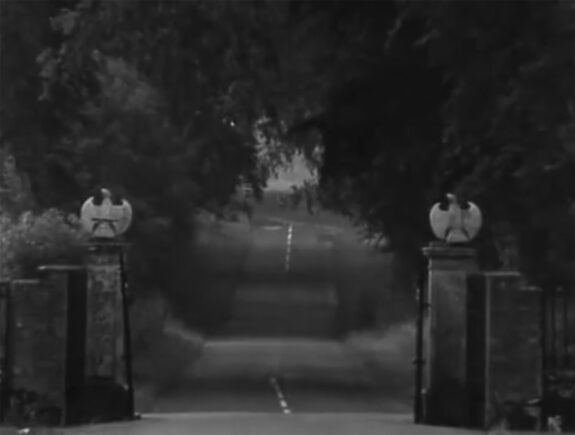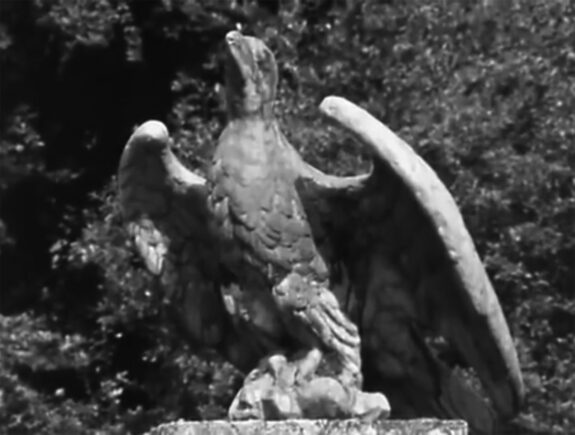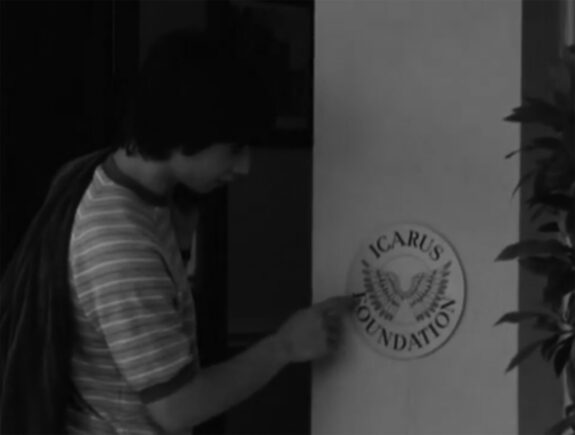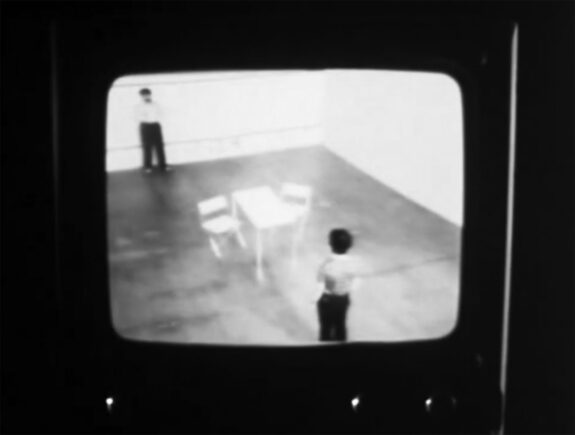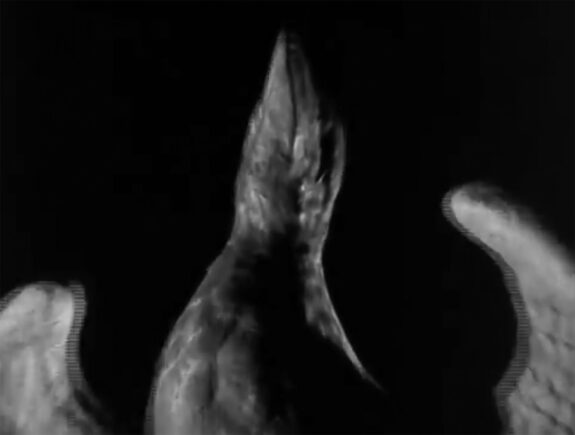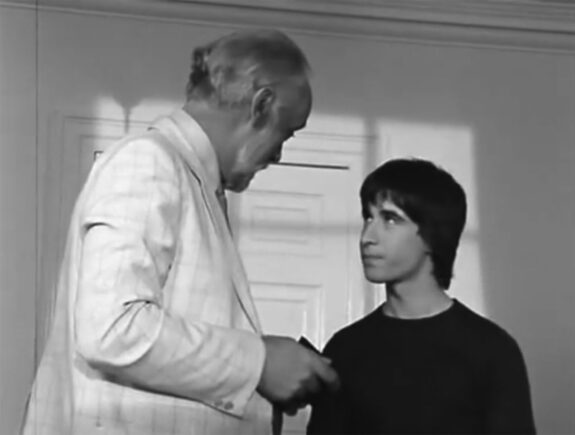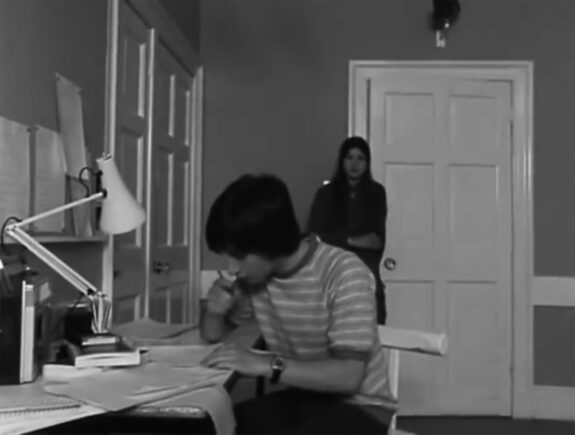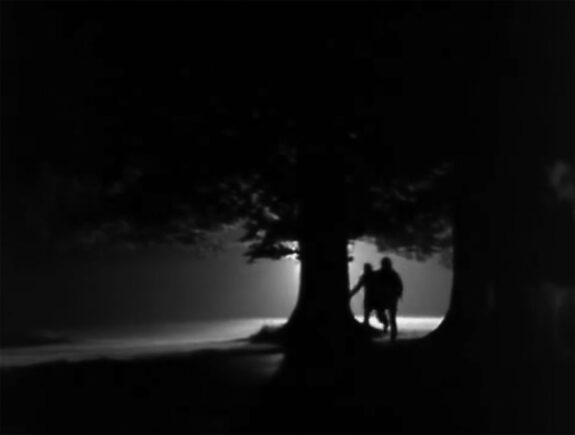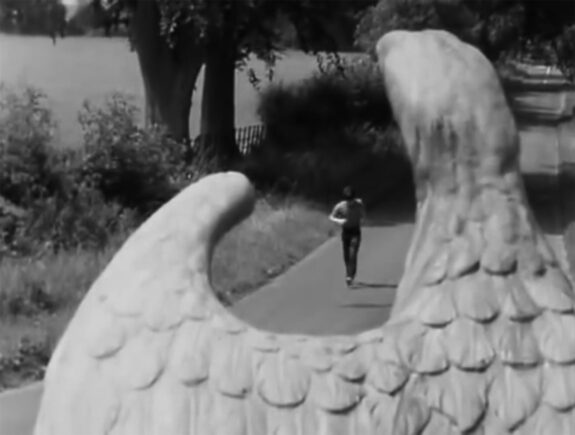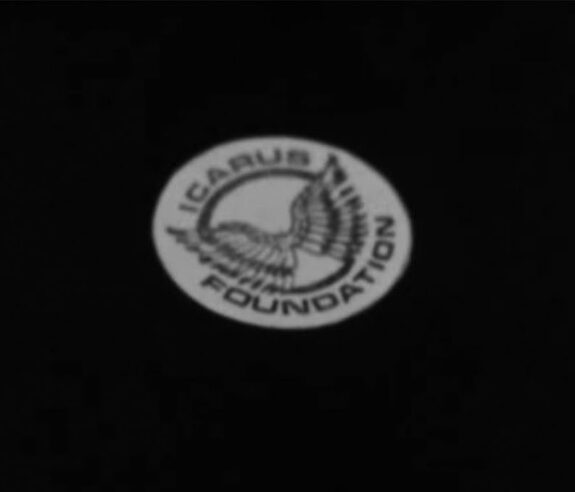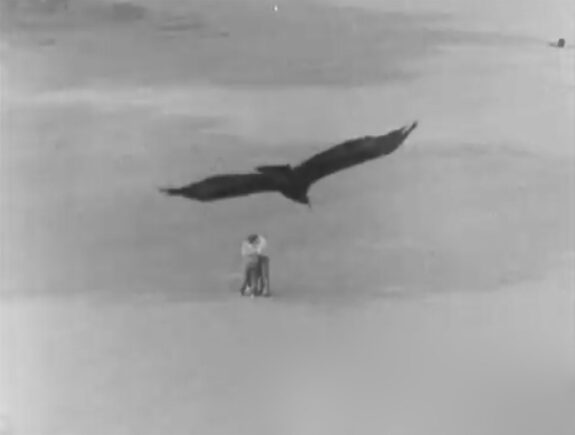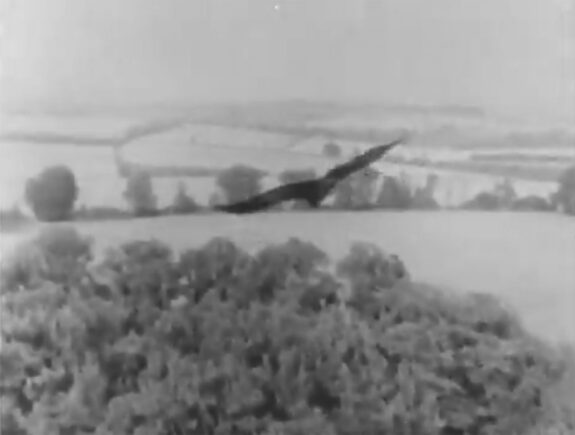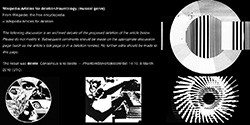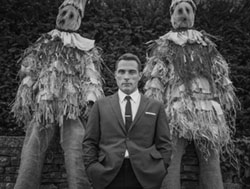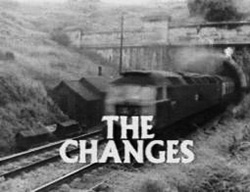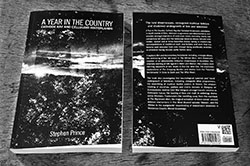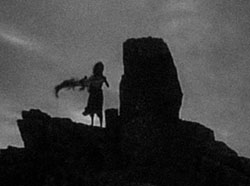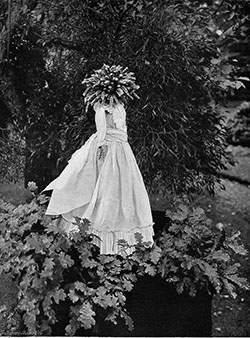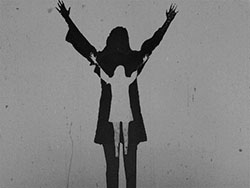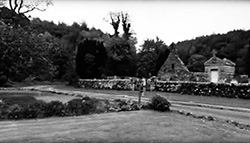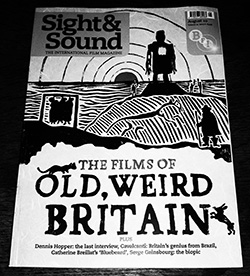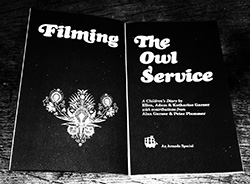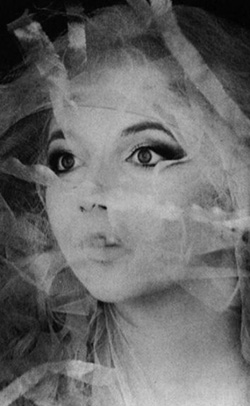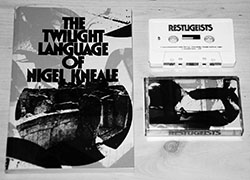As I have written elsewhere at A Year In The Country there is a strand of late 1960s to approximately early 1980s British children’s and young adult television drama that has become a hauntological and wyrd or otherly pastoral reference point due in part to its odd, unsettling and adult themes and atmospheres:
“For most of its history, children’s television has been childish. Shows with simplistic plots and large casts of children have long dominated the afternoon schedules… Yet during the 1970s, commissioners slowly began to experiment with more mature programming, bringing in adult themes in disguise through science fiction and fantasy shows such as Ace of Wands, The Tomorrow People and Timeslip… By the late ’70s and early ’80s, this pushing of boundaries meant it was possible to have a programme on children’s television that was firmly embedded in an adult genre, with mainly adult leads and adult dialogue, and for it still to be accepted as a children’s show.” (Quoted from “Lost Gems: Codename Icarus”, Rob Buckley, the-medium-is-not-enough.com)
As commented on by Andy Beckett and Roger Luckhurst in The Disruption booklet published in 2017, which I have discussed elsewhere, that explored The Changes (1975) dystopic television series which is part of the above strand, this pushing of boundaries may have been part of the wider sense of experimentation and liberalism that was present in society in the 1960s and 1970s and which came to be present, to a degree, in large scale cultural institutions such as the BBC.
Although not as prominent or well known as some of the above mentioned programmes and others which are part of this strand, such as The Owl Service (1969-1970) and Children of the Stones (1976), the BBC children’s drama Codename Icarus (1981) could also be considered to belong to it. Rather than being purely fantasy orientated it drew quite specifically from contemporary events in the real world and explored the Cold War and resulting arms race, around which tensions were heightened when the series was first broadcast.
(In this drawing from the real world Codename Icarus has parallels with the also slightly less well known 1979 young adult television series Noah’s Castle, which I have also discussed elsewhere, that could be grouped with this strand of television. This dealt with adult themes by extrapolating from contemporary societal problems to create a near future Britain plagued by hyperinflation, dysfunction and food shortages.)
Produced by the BBC and consisting of five half hour episodes, Codename Icarus was only rebroadcast once on British television in 1984, was released on VHS cassette in the UK by BBC video in 1985 and on DVD in 2006 by Home Vision Entertainment in the US. The DVD is out of print and at the time of writing the series has not been officially released to stream etc online.
The plot involves the supposedly benevolent privately funded Icarus Foundation, which headhunts the brightest teenage science pupils and free of charge provides them with a place in its international system of residential schools, where they are provided with the resources which will enable them and their work to flourish. One such pupil is Martin Smith, a mathematical physics prodigy who is misunderstood by the teachers in his conventional school, as they mistake his advanced abilities for arrogance and cheating. He accepts a place at the Icarus Foundation’s Falconleigh school, which is in an isolated rural location and overseen by the subtly eerie and creepy John Doll. Fairly quickly after arriving Martin begins to question the Foundation’s activities and becomes aware that he and his fellow pupils are being used to carry out research intended for military use. However he is unable to escape as in order to ensure the pupils remain compliant, keep them focused on their work and to stop them leaving they are subject to routine CCTV surveillance, brainwashing, hypnosis and given psychotropic drugs.
Accompanying events with Martin and at the school is an interwoven plot where submarine launched British nuclear missiles are destroyed during testing by some method unknown to the military and scientific communities. The British naval intelligence agent Andy Rutherford, who tries to investigate how this is being done and by who, thinks it may be the result of technology developed by a group working outside the known scientific community. He begins to suspect that the Icarus Foundation is involved but is met by high-level opposition within the apparatus of the state and intelligence services when he tries to investigate the Foundation. He is subsequently suspended, apparently due to directives from those high levels, with the intention of stopping his “meddling”, after which he begins his own unauthorised investigation. He infiltrates Falconleigh by posing as a tutor, discovers it is behind the missiles’ destruction and attempts to stop its schemes and rescue Martin.
Visually the series has aged fairly well as, although loosely science fiction orientated in subject, it does not feature much in the way of special effects, the use of which can often cause programmes to appear dated, particularly when produced with relatively limited budgets, as much of British children and young adult genre television was in the 1970s and 1980s. Imagery of submarines, missiles, explosions etc in Codename Icarus utilise pre-existing real world footage which, while it jars slightly due to it having a different visual appearance to other sections in the series, means that the depiction of them avoids the use of potentially dating special effects. Also the series largely appears to have been shot on location, which avoids the “wobbly studio sets” that was prevalent in much British genre television in the 1970s and early 1980s. Alongside this the technology featured in the series, such as the computers Martin uses, are generally of real world commercial origin, which means that, while they decidedly belong to their period, they sidestep the “futuristic banks of flashing lights and high-tech gizmos” that can cause series to appear more unrealistically dated.
(As an aside, Martin has his own professional level personal computer in his room at Falconleigh, which in the early 1980s, when such devices were still relatively expensive and rare in homes and schools, may have seemed like a notable indicator to viewers of the Icarus Foundation’s ability and willingness to provide considerable resources for its pupils.)
The series was written by Richard Cooper, who also wrote the novelisation released in the same year as its first broadcast, and directed by Marilyn Fox, both of whom worked on other television series which intersect with the above mentioned strand of British children’s television which had surprisingly odd and adult themes. Cooper also wrote children’s drama series Knights of God (1987), in which a future Britain that combines elements of rural Medieval-like life and futurism is ruled by an oppressive militaristic religious order that utilises brainwashing “re-education camps”, from which two teenagers escape and join a quest to find the rightful King of England and restore democracy. Fox also directed the one off children’s drama The Bells of Astercote (1980), in which two young children discover a man in the local woods who is protecting an ancient chalice that he believes is keeping at bay an ancient pestilence which once wiped out the nearby village of Astercote.
(The Bells of Astercote was written by Penelope Lively, who also wrote the 1971 young adult novel The Wild Hunt of Hagworth, which focuses around the revival of ancient folklore rituals in contemporary times and can be considered to be part of a strand of work from around that time which explored similar themes and which is discussed further in the post “Shadows Episode “The Inheritance” and the Layering of Ancient Folklore and Myth – see link below.)
At times the above mentioned strand of television intersects with some of the tropes of folk horror in that rural settings are depicted as having a flipside to their more bucolic aspects. As part of this in folk horror such locations are used and depicted as places which contain or allow for hidden layered or preternatural stories and/or actions which variously sidestep, skew, transgress and stand apart from conventional wider society’s beliefs. These actions and subsequent events are often facilitated by the isolated nature of the rural settings. A number of these aspects are present in Codename Icarus; as referred to previously Falconleigh is situated in an isolated rural setting, more specifically in a grand mansion style house with extensive, well-kept, beautiful and idyllic gardens. Here the Icarus Foundation are able to sequester their pupils from the world and avoid potential questions about its methods, although this isolation is cloaked as being for the pupils’ benefit in order that they can concentrate on their work, and acceptable norms of behaviour are able to be cast aside.
The Icarus Foundation is depicted as a quietly efficient and ruthless organisation which in the pursuit of its goals appears to be driven by a belief that the end justifies the means, whatever the cost to people or nature. This is particularly heightened in a section when Martin, who is a keen birdwatcher, observes a bird flying over the school gardens, which is intercut with scenes of the Foundation demonstrating the weapon technology it has created to Soviet military officers by destroying an aeroplane as it flies across the sky. The plane crashes into the sea and the bird suddenly plummets from the sky after flying over a semi-hidden building in the gardens of Falconleigh (which is later revealed to contain weapons development related experimental equipment that caused the bird’s death). Martin runs to the fallen bird and finds it dead, those involved in the military technology demonstration are shown congratulating one another on a job well done and this then segues into Martin stroking the dead bird before silently screaming and the episode abruptly ends on this unnerving image.
There are number of other sections of the series which make for unsettling viewing, particularly scenes related to the brainwashing of pupils at Falconleigh. They are repeatedly summoned to a squash court, which is empty apart from a table and chairs, where they take part in “The Game” with their assigned tutor. During this they are subject to a form of brainwashing or gaslighting whereby they come to question the truth of what they have seen or believe if it is likely to threaten the furtherance of the Foundation’s aims. Through the mental manipulation of The Game, and elsewhere the use of deep hypnosis and drugs, it is instilled in the pupils that the only safe place for them and their work is Falconleigh and when necessary they are induced to work until they drop.
Accompanying this there is a sense of the corruption and exploitation of nature, as part of this process of brainwashing involves, in Martin’s case, the use of ominous aggressive bird caws, recordings of which are embedded in his mind by his controllers at Falconleigh and are triggered in a terrifying hallucinatory manner by the stone bird ornaments at Falconleigh’s gates. This stops him from being able to escape and creates a hidden from view and non-physically violent but nonetheless effective form of incarceration which, as with “The Game”, is somewhat unsettlingly depicted.
The unsettling aspects of the series are given a real world connection and heightening due to the contribution and background of author and academic Professor John Taylor, who is listed in the credits as providing scientific advice. Although precisely what he advised on is not made clear, it may have been connected with the area of mathematical physics that Martin works on in Codename Icarus, as this was one of the areas that Taylor worked in during his career, alongside a wide-ranging number of subjects, which also included research into scientific explanations for the paranormal.
It is also possible that Taylor’s advice was on the subject of mind control, as he was the author of The Shape of Minds to Come: A Startling Report on the Mind Mechanics of the Future, which was originally published in Britain in 1971 by the independent publishing company Michael Joseph and reissued in 1974 by the high profile mainstream commercial publishers Penguin. In this book Taylor considered how developments in the future would allow for the modification of the brain, moods and increase in intellect. Although it presented a more optimistic view than is present in Codename Icarus of the reasons for and ways that the mind could potentially be controlled or enhanced, a number of its subjects intersect with the brainwashing methods used by The Icarus Foundation:
“With a happy hedonistic grin Professor Taylor predicts that in the not-too-distant future… electrodes [will be] placed in the… reward centers of the brain. A wide range of human drives and moods – sleep, hallucinations, aggression… will be ‘packed and sold across the counter’… Dr. Taylor is hopeful that chemistry and electricity can wipe out criminality, disease and stupidity. Human self-awareness is destined to multiply exponentially as carefully controlled foetal environments, infant brain grafts, memory pills and the preservation of disembodied brains raise the level of human intellect individually and collectively… Dr. Taylor’s book incorporates a good deal of the most recent research in biochemistry, hypnotism and psychology sandwiched in between his startling conclusions… Taylor remains an optimist as to the nature of society and politics after the mental revolution… ” (Quoted from “The Shape of Minds to Come”, kirkusreviews.com, author and date unknown.)
There is a perhaps unintended comment in Codename Icarus on British Northern (or at least non-London and Home Counties) working class authenticity and morality versus British Southern and related metropolitan privilege and corruption. Reflecting this Martin’s suspicions about The Icarus Foundation’s motives seem initially to stem more from a distrust of its privilege aping and “airy fairy” nonconventional liberal ways, rather than being based in anything he has discovered about its activities (the pupils are formally served their food by white clad waiters in an opulently decorated dining room, they are called “sir” by their tutors, who they are instructed to call by their surname, due to the pupils’ supposed intellectual superiority and so on). Martin also has a notable Northern accent and his personality is abrasive, rebellious, aggressively and bluntly confident and no nonsense in a manner not dissimilar to a more brattish teenage take on the “angry young men” of 1960s British New Wave cinema.
A number of similarities can also be noted between Codename Icarus and the iconic television series The Prisoner (1967-1968). In both a central abrasive and rebellious character does battle with a hierarchical organisation, which on the surface appears benevolent but which is actually controlling and sinister. Also in both the central character is incarcerated in an isolated and initially idyllic seeming rural and/or coastal community and subject to near omnipresent surveillance, and the “organisation” uses mind control techniques on their “prisoner”, which includes mental manipulation and the administering of psychotropic drugs when they are asleep in order to bend them to its will.
In Codename Icarus, Martin does not come from a privileged background and before entering Falconleigh School he is shown as living in a very normal working class area. This is in marked contrast to the Falconleigh school which, as previously mentioned, is situated in a country mansion house and idyllic gardens and its controller’s office, which is decorated in a classical near aristocratic manner. Martin’s background, demeanour and accent is also at odds with the non-region specific accents of a number of the duplicitous characters in the series and also the arrogant smugness and upper middle class manners of a high ranking member of the intelligence community who is the intelligence agent Rutherford’s superior. Martin’s motivations throughout are shown to be, albeit possibly somewhat naively, pure in intention, whereas this often does not seem to be so with regards to those he meets who are from different backgrounds.
Martin describes the work the Icarus Foundation have him doing as being on a path towards and pushing at the door of something dreadful, and that when it opens there will be nothing there or “maybe it will be the end of the world”. He realises that he is working on the theoretical basis for a quark super bomb that will be capable of wiping out not just cities but whole continents. Due to his uniquely advanced and prodigious grasp of mathematical physics, which will enable the development of this bomb, he becomes the most important and valuable pupil and “asset” of The Icarus Foundation, which expends considerable effort, including further extensive brainwashing, in order to keep him both focused on his work and to prevent him from leaving.
Throughout Martin aggressively and unswervingly attempts to defend the purity of his theoretical mathematical physics work and berates those who cannot see its beauty (this includes a teacher at his former conventional school, of whom he says showing him his work would be like giving flowers to an ape). As the series progresses he becomes caught in a set of moral quandaries due to him being driven to complete his work, which he does not seem to be able to stop even when he is helped to escape from Falconleigh by Rutherford and his accomplice rogue helpers, but at the same time he knows that it, as with much of scientific knowledge, could be utilised for both good and bad.
Codename Icarus does not present a well-defined good versus bad view of science nor the series’ protagonists and the states and alliances involved in the Cold War. Rather these various sides and protagonists are shown to be morally complex and at times to be involved in a murky and morally ambiguous world that might be more expected to be found in the likes of BBC adult orientated dramas from a similar period, such as nuclear conspiracy thriller Edge of Darkness (1985) and the labyrinthine Cold War espionage thriller Tinker Tailor Soldier Spy (1979), rather than children’s or young adult television.
In both of those series there is a paranoid hall of mirrors sense of not knowing who you can trust, who holds what knowledge or what the motives are of those involved in the intelligence services and hierarchies of power. Also, particularly in Tinker Tailor Soldier Spy, there is an accompanying sense that these hierarchies etc have been deeply infiltrated and corrupted by those they are intended to be working actively against or to control, and also that there is a refusal within them to accept that “one of their own” or those in positions of power within that hierarchy could possibly be duplicitously working for the “other” or “wrong” side.
Similar aspects can be found in Codename Icarus; the Icarus Foundation has gained hidden influence and control at high levels of society’s hierarchy, Rutherford thinks he is working independently after he has been suspended by naval intelligence but eventually is told by his controller that they knew what he was doing all the time and so on.
All three of these series draw from and reflect the times of their making and the real world background of fear, paranoia and distrust engendered by the Cold War and also, particularly in the case of Tinker Tailor Soldier Spy, the post Second World War infiltration of the British intelligence services by what has become known as “the Cambridge spy ring”. (Footnote 6)
This “ring” and the resulting scandal when several of its members activities were exposed and they defected to the Soviet Union in the early 1950s and 1960s are specifically referred to in Codename Icarus; Rutherford discusses with a superior the way his investigations are being frustrated due to his suggestion that the Icarus Foundation and its creation of special schools for the gifted is anything but benevolent being met with disbelief by those in positions of power. His superior replies jokingly “Who, one wonders, is the ‘fourth nanny’? Will she ever be unmasked?”
This is a direct reference to the Cambridge spy ring’s mysterious fourth man, who was offered immunity and secrecy in exchange for revealing details of the ring’s activities to the British intelligence services and whose identity remained unknown to the general public until 1979, only slightly prior to Codename Icarus’ first broadcast, when he was revealed to be Anthony Blunt.
The subjectivity and ambiguity of being on the “right side” is explored in Codename Icarus when Rutherford attempts to tell Martin that he will make sure his work will not be seen by the wrong people. Martin challenges him, and the unspoken moral assumption that the wrong people would be anybody but the Western alliance, by merely saying “And you’d decide that? But the bomb would still get made, wouldn’t it?” To which Rutherford has no answer.
The series is less ambiguous in regards to the Cold War arms race. This is notably highlighted when a Russian military officer comments to Froelich, the founder and patron of The Icarus Foundation, that the technology the Foundation has created, which can destroy nuclear missiles after they have launched, has rendered the money spent by the West on them a waste. Froelich replies with a heavy heart “It’s all a waste of money. A never ending game of leapfrog.” However such lack of ambiguity in the series is relatively rare, and some of the final scenes add a particularly complex layering of moral questions and stances.
At the end of the fourth episode Martin, and a female pupil with whom he has grown close and shared his discoveries about the true nature of the Icarus Foundation, are helped to escape from Falconleigh by Rutherford, his accomplices and Martin’s brother (who came to the school after being concerned about not hearing from him). Martin is only briefly free as he returns to Falconleigh after coming into contact with his former tutor, who taps into and utilises the ideas he previously embedded in Martin via brainwashing in order to impel him to do so.
There is a subsequent confrontation between Martin and the Icarus Foundation’s founder Froelich, which again takes place in the empty squash court, the location of “The Game”. Froelich reveals that he uses the scientific research carried out by the pupils to create weapons, which he sells first to one side of those involved in the Cold War, and then the opposing side. He talks of how he does this in order to effectively control the world and its conflicts by ensuring that no side has the upper hand, causing the different sides to “sweat in a dance of fear”.
His actions and the Cold War conflict are given a deeper historical founding, and moral complexity, when he describes to Martin how he too had been a mathematical physics child prodigy. Froelich emotively relates how his experiences during the Second World War, when he falsified his research that the German state were attempting to use in order to build a nuclear weapon, left him with a hatred of men in power and disgust that they would sully science with such intentions. It also caused him to lose his “gift” in physics, as he had not followed his role as a scientific “teller of truth”.
He goes on to talk of how this led him to found The Icarus Foundation, which would nurture the gift of scientific ability in others, funding it by the sale of the results of their work in developing the theories which underpinned and could help develop weapons (although he does not acknowledge the somewhat perverse nature of this).
Froelich tells of how the eventual destination of his work with the Icarus Foundation is the quark bomb that is intended to be the “final solution”, the ultimate mutually assured destruction deterrent weapon, which he thinks Martin has the ability to be the creator of:
“We have all the power of history in our hands. You and I. We can make the world beautiful, perfect.”
To which Martin replies, still clinging on to his optimistic view of his work and the use of science:
“And I know what kind of world it would be. Like Falconleigh, where everything seems perfect but everyone’s watched, controlled, doing what we decide. You used science to kill the birds. Now you want to kill men. Kill them inside. I want to use science to make men free. I want a world where they can fly.”
This discussion, as with the series as a whole, grapples with some very complex moral questions: a youthful scientific research prodigy who has lived through and experienced first hand the actions of the German state during the Second World War goes on to attempt to stop future outright conflict and abuses of power; he does this by setting up an organisation that – unbeknownst to them, their parents or the wider world – utilises the abilities of school age children, and when necessary brainwashes them, in order to develop weapons that are sold to all sides to maintain the balance of power; the proceeds of these sales are cyclically used to nurture the abilities of those children and therefore develop more weapons; this subsequently heightens the level of threat by developing ever more powerful weapons and fuelling the arms race.
Accompanying these already complex themes is a debate around the origin of intellect and its possessor’s duties towards it:
“Martin’s intellect is presented as a gift almost from God that cannot be wasted – [Froelich describes it as] ‘A tiny glimmer of light in a great darkness’. He has to act according to the rules of the gift or else it will be taken from him.” (Quoted from “Lost Gems: Codename Icarus”, as above.)
Those rules seem to include following it wherever it needs or can go, whatever the consequences, even if they mean creating theories which lead to a weapon that could destroy all of civilisation.
The questions raised in the series with regards to the ends justifying the means in terms of the morals of scientific research, which side is the “good side” etc are quite dizzyingly complex and ambiguous, particularly when put in the context of the series’ intended young tea time audience (it was broadcast on week nights around 5pm).
The drama ends in an open-ended manner; the police and intelligence agents arrive en masse to apprehend Froelich, and Martin is shown running across Falconleigh’s gardens to embrace his fellow escapee and his brother, who have arrived with the authorities. This then segues into a bird flying which fades into an aerial view of rural fields.
This ambiguous ending implies that Martin’s idealism is unlikely to end any time soon but also that it contains a moral naivety at odds with reality. In the context of the Cold War arms race, it is unlikely that his own Western “side” of the conflict will be prepared to merely let slip away the military and political strategic advantage that his ability in mathematical physics may provide. The embrace with his friend and brother may well just be a brief moment of normality before he is plunged into a further murky world of political power battles and moral quandaries which will seek to use, and possibly corrupt, the science and seeking of knowledge which he holds so dear.
Elsewhere:
- The Codename Icarus trailer
- The “Lost Gems: Codename Icarus (1981)” at The Medium is Not Enough Site
- The Disruption (The Changes) at Texte und Töne’s site
- The Changes DVD at the BFI’s site
- The Noah’s Castle trailer
- The Edge of Darkness Blu-ray at HMV’s site
Elsewhere at A Year In The Country:
- The Changes / The Disruption – Notes on a Flipside of the Pastoral Conversation
- The Changes, Threads, the bad wires and the ghosts of transmissions
- The Changes, The Owl Service, Robin Redbreast, The Ash Tree, Sky, Penda’s Fen and Red Shift – Wanderings Through Spectral Television Landscapes
- The Tomorrow People Intro: Audio Visual Transmission Guide
- The Tomorrow People in The Visitor, a Woolworths-esque filter and travels taken…
- The Owl Service, The Prisoner, The Tomorrow People, The Village of the Damned, Quatermass, Zardoz, The Wicker Man, The Touchables, Sapphire and Steel, The Nightmare Man, Phase IV and Gone to Earth – A Gathering of a Cathode Ray Library and Rounding the Circle
- Filming The Owl Service; Tomato Soap and Lonely Stones
- She Wants to be Flowers – Filming The Owl Service (Revisiting)
- The intro to The Owl Service: Audio Visual Transmission Guide
- The Owl Service: fashion plates and (another) peek behind the curtain
- Children Of The Stones intro – Audio Visual Transmission Guide
- Noah’s Castle; a slightly overlooked artifact…
- A slightly overlooked artifact 2; Noah’s Castle and spectacular vs participative media
- Noah’s Castle – A Slightly Overlooked Artifact and Teatime Dystopias
- Shadows Episode “The Inheritance” and the Layering of Ancient Folklore and Myth
- Edge Of Darkness, stepping into the vortex, reshuffling and sweeping the board…
- Edge of Darkness – Revisiting Hidden Silhouettes
- Edge of Darkness, Lost Futures, Mark Fisher, Look Around You, Moon Stallion and Universal Harvester – The End of a Yearly Cycle and Something of a Round Up
- Edge of Darkness, In The Morning I’ll Be Gone, Orkney Twilight and GB84 – Hinterland Tales Of Myths, Dark Forces and Hidden Histories
- The Prisoner Part 1 – A Visit to a Real Life High-Definition Dream
- The Prisoner Part 2 – Ongoing Battles and a Circle of Escape

